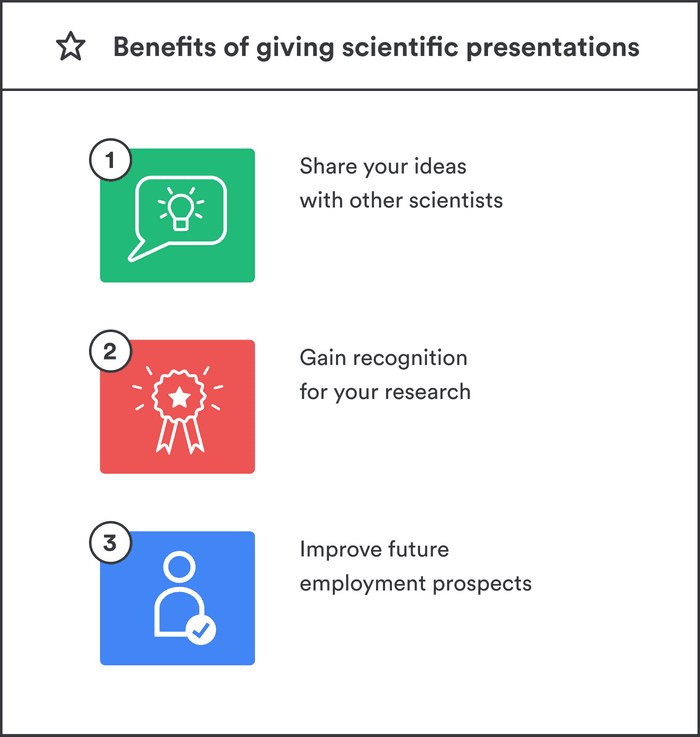How to give a good scientific presentation [with tips]

You have made the slides for your scientific presentation. Now, you need to prepare to deliver your talk. But, giving an oral scientific presentation can be nerve-wracking. How do you ensure that you deliver your talk well, and leave a good impression on the audience?
Mastering the skill of giving a good scientific presentation will stand you in good stead for the rest of your career, as it may lead to new collaborations or even new employment opportunities.
In this guide, you’ll find everything you need to know to give a good oral scientific presentation, including
- Why giving scientific presentations is important for your career;
- How to prepare before giving a scientific presentation;
- How to keep the audience engaged and deliver your talk with confidence.
The following tips are a product of our research into the literature on giving scientific presentations as well as our own experiences as scientists in giving and attending talks. We advise on how to make a scientific presentation in another post.
What is a scientific presentation?
A scientific presentation is a talk or poster where you describe the findings of your research to others. An oral presentation usually involves presenting slides to an audience. You may give an oral scientific presentation at a conference, give an invited seminar at another institution, or give a talk as part of an interview. A PhD thesis defense is one type of scientific presentation.
What is the objective of a scientific presentation?
The objective of a scientific presentation is to communicate the science such that the audience:
- Learns something new;
- Leaves with a clear understanding of the key message of your research;
- Has confidence in you and your work;
- Remembers you afterward for the right reasons.
Why is giving scientific presentations necessary?

As a scientist, one of your responsibilities is disseminating your scientific knowledge by giving presentations. Communicating your research to others is an altruistic act, as it is an opportunity to teach others about your research findings, and the knowledge you have gained while researching your topic.
Giving scientific presentations confers many career benefits, such as:
- Having the opportunity to share your ideas and to have insightful conversations with other scientists. For example, a thoughtful question may create a new direction for your research.
- Gaining recognition for your work and generating excitement for your research program can help you to forge new collaborations and to obtain more citations of your papers.
- Improving your future employment prospects by having presentations listed on your academic CV.
How to give a scientific presentation
Giving your talk with confidence is crucial for your credibility as a scientist. In his YouTube talk on rethinking scientific presentations, Penn State professor Michael Alley suggests that confident delivery of your talk is essential for you and the content of your talk to be remembered and believed.
Our tips for delivering your talk are organized as follows:
- Tips for the days before your scientific presentation
- Tips for dealing with presentation nerves
- Tips for giving your presentation
- Tips for being adaptable during your presentation
- Tips for the end of your scientific presentation
Tips for the days before your scientific presentation
- Rehearse your talk multiple times to ensure that it flows smoothly. Memorize the order of your slides, and be aware of key transitions. It's not necessary to memorize every word of your presentation. Practice your speech as though you are discussing with attentive listeners.
- Giving a talk is a performance. Preparing yourself physically and mentally is more important than you think. Get a good night’s sleep, be hydrated and eat nourishing food before the talk that won’t give you low blood sugar, or unsettle your stomach. Plan what you will wear. Choose professional clothes that you will feel comfortable in.
- Be prepared. Know the time and location of your talk. Go to the room if possible and familiarize yourself with your surroundings. Introduce yourself to the moderator.
- Have your talk backed up in cloud storage and on a USB key. Bring a laptop if necessary.
Tips for dealing with presentation nerves
- Fight off impostor syndrome with affirmations and breathing exercises. You’ve got this! Remember that you know more about your research than anyone else in the room and are giving your talk to teach others about it.
- Project confidence outwardly, even if you feel nervous. Stand up tall, and make eye contact with individuals in the audience. For the audience to feel as though you are speaking to everyone, move your focus around the room.
- Memorize a simple opening. After the moderator introduces you, pause and take a breath. Welcome the audience, thank them for coming, and introduce yourself. You don’t need to read the title of your talk. But briefly, say something like, “today I’m going to talk to you about why [topic] is important and [what I hope you will learn from this talk]” in one or two sentences. Preparing your opening will settle your nerves and prevent you from starting your talk on a tangential topic, ensuring you stay on time.
- Keep your use of a laser pointer to a minimum. Use it only if you have to emphasize information on the slide, and if doing so helps your explanation. Using a laser pointer can be off-putting for the audience if you are very nervous (if you are prone to having a shaky hand!) Careful design of your slides can often mean that using a laser pointer is not necessary.
Tips for giving your presentation
- Project your voice as much as you can so that people at the back of the room can hear you. Enunciate your words. Don’t mumble or trail off awkwardly.
- Varying your vocal delivery and intonation will make your talk more interesting and help the audience pay attention, particularly when you want to emphasize key points or transitions. Ensure to take pauses at crucial moments.
- Face the audience as much as possible, not your slides. Have open body language.
Tips for being adaptable during your presentation
- Disruptions to talks can occur. If you make a mistake, or a technical issue occurs during your talk, don’t apologize. It’s okay to skip something and move on.
- If you forget an item that the audience hasn’t noticed, don’t point it out! They don’t need to know.
- As you give your talk, be aware of the time remaining, and watch the moderator for signals that the time is about to expire. If you realize you won’t have time to discuss all your slides, skip the less important ones. And if you run out of time completely, just stop. You are not obligated to give a conclusion, but you are obligated to stop on time! Practicing your talk should prevent this situation.
Tips for the end of your scientific presentation
- Conclude your talk with a memorized closing statement that summarizes the key take-home message of your research. After making your closing statement, end your talk with a simple “Thank you”. Then pause and wait for the applause. You don’t need to ask if the audience has questions because the moderator will call for questions on your behalf.
- When you receive a question, pause, then repeat the question. This gives you more time to compose yourself and consider the answer you will give. In his YouTube talk on attaining confidence in your scientific presentations, Michael Alley suggests that if you don’t know the answer to the question, then emphasize what you do know. Say something like, “Although I cannot fully answer your question, I can say [this about the topic].” Try to anticipate questions in advance, and practice your answers. Approaching the Q&A session with curiosity, rather than fear, is a great way to reframe what is the most stressful part of the presentation for many!
Concluding thoughts
Communicating your research effectively is a key skill for early career scientists to learn. This guide has shown you how to give a successful scientific presentation that the audience will understand and remember. Taking the time to prepare and practice your presentation is an investment in your scientific and professional development.
Giving compelling scientific presentations will raise your professional profile as a scientist, leading to more citations of your work, and may even help you obtain a future academic job. But most importantly of all, giving talks contributes to science, and sharing your knowledge is an act of generosity to the scientific community.
Other sources to help you give a good scientific presentation
Frequently Asked Questions about giving scientific presentations
💬 What are 5 tips for giving a good scientific presentation?
1) Have a positive mindset. To help with nerves, breathe deeply and keep in mind that you are an authority on your topic. 2) Be prepared. Have a short list of points for each slide and know the key transition points of your talk. Practice your talk to ensure it flows smoothly. 3) Be well-rested before your talk and eat a light meal on the day of your presentation. A talk is a performance. 4) Project your voice and vary your vocal intonation and pitch to retain the interest of the audience. Take pauses at key moments, for emphasis. 5) Anticipate questions that audience members could ask, and prepare answers for them.
🎯 What is the goal of a scientific presentation?
The goal of a scientific presentation is that the audience remembers the key outcomes of your research and that they leave with a good impression of you and your science.
🤓 How do you introduce yourself at the start of a scientific presentation?
Take a moment to exhale deeply and collect your thoughts after the moderator has introduced you. Don’t read your talk's title. Instead, introduce yourself, thank the audience for attending, and provide a warm welcome. Then say something along the lines of, "Today I'm going to talk to you about why [topic] is important and [what I hope you will learn from this presentation].” A rehearsed opening will ensure that you start your talk on a confident note.
🍒 How do you end a scientific presentation?
Prepare a memorable closing statement that emphasizes the key message of your talk. Then end with a simple “Thank you”.
🦉 How do you appear confident when giving a scientific presentation?
Preparation is key. Practice many times to familiarize yourself with the content of your presentation. Before giving your talk, breathe slowly and deeply, and remind yourself that you are the expert on your topic. When giving your talk, stand up tall and use open body language. Remember to project your voice, and make eye contact with members of the audience.


